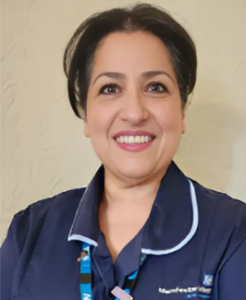 On International Nurses Day (IND), Nurse Manager in Adult Haematology-Oncology Research, at Manchester Royal Infirmary, part of Manchester University NHS Foundation Trust (MFT), Sita Rostampour shares her passion and pride for the role of nursing in research and innovation.
On International Nurses Day (IND), Nurse Manager in Adult Haematology-Oncology Research, at Manchester Royal Infirmary, part of Manchester University NHS Foundation Trust (MFT), Sita Rostampour shares her passion and pride for the role of nursing in research and innovation.
Being in this role is more than just a job, it’s a privilege. Every day I witness the impact research has, not only in advancing science but in shaping real outcomes for people living with cancer and blood disorders. As a nurse at the heart of research, I have the chance to contribute to better treatments, offer more hope, and help pave the way for future innovations in care. That’s incredibly powerful.
My role is based within a fast-paced and dynamic team, where I lead a complex portfolio of clinical trials, supporting not just our patients but also my team and the wider research delivery landscape.
My journey has inspired me to continue growing. I’m currently studying for a master’s degree in clinical research delivery – a fantastic opportunity made possible through the National Institute for Health and Care Research (NIHR) and support from Research and Innovation (R&I). This course is already shaping my practice and future aspirations, and I’m grateful for it.
My experience as a research nurse has given me countless moments that I am proud of. One standout study involved an early-phase treatment for patients with a rare lung condition called Interstitial Lung Disease (ILD).
The term ILD encompasses a wide range of conditions that cause scarring (fibrosis) of the lungs. The scarring causes stiffness in the lungs which makes it difficult to breathe and get oxygen to the bloodstream. Lung damage from ILDs is often irreversible and gets worse over time.
Traditionally, ILD patients in the NHS could access two medications, Pirfenidone and Nintedanib. These medications can have significant side effects, often resulting in patients stopping treatment. Access to these therapies is typically restricted to patients with a Forced Vital Capacity (FVC) between 50 per cent and 80 per cent, under specialist ILD services. FVC measures how much air a person can forcefully exhale after a deep breath. It’s a key component of tests that help clinicians assess lung capacity and detect conditions like obstructive or restrictive lung disease.
In this trial I was deeply involved in patient recruitment, care coordination, and ensuring ethical, safe trial delivery.
The clinical trial provided the opportunity for patients with FVC between 40 per cent and 95 per cent to access a new medication, this is a broader range than current NHS criteria. This new treatment had less side effects and gave patients a much-needed alternative.
Patients’ data from the early-phase study showed promising outcomes, with many tolerating the medication well and being able to continue treatment longer compared to existing therapies.
Research like this gives patients more options, potentially bringing tomorrow’s treatments to people who need them today. Being part of that journey is something I’ll always carry with pride.
What I love about my job
What I love most is the people; our patients, my team, and the wider multidisciplinary colleagues I get to work with every day. At Manchester Foundation Trust (MFT), two of our core values are compassion and curiosity and to me, being a research nurse is where compassion meets curiosity. It’s a role that challenges my mind while still holding space for the human side of care.
I also have a real passion for learning and teaching, which this job satisfies completely.
Why International Nurses Day matters
To me, International Nurses Day is a chance to pause and truly celebrate the rich diversity of our profession. It’s a day to recognise the dedication of nurses across every setting; wards, communities, clinics, and research teams like ours. This day reminds the world that nurses are key players in innovation and healthcare transformation.
The theme for International Nurses Day 2025 is “Our Nurses. Our Future. Caring for nurses strengthens economies.” Looking to the future, I hope to continue supporting others especially through mentoring and creating inclusive spaces where people feel they belong. I’m working actively as part of our R&I Equity, Diversity and Inclusion (ED&I) Group, and I believe wholeheartedly that a diverse, supported workforce is essential for delivering research that reflects the communities we serve.
Eventually, I hope to take on a sub-Principal Investigator role where I would be assisting the study lead. With the right support structures in place, I believe we can build a more inclusive and empowered research nursing workforce – and that’s a future I’m excited to be part of.
To all the nurses out there – whether you’re in direct care, education, research, or somewhere in between – Happy International Nurses Day! Your work matters, and together, we are shaping a better tomorrow.